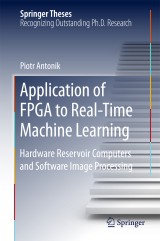Details

Application of FPGA to Real‐Time Machine Learning
Hardware Reservoir Computers and Software Image ProcessingSpringer Theses
|
106,99 € |
|
| Verlag: | Springer |
| Format: | |
| Veröffentl.: | 18.05.2018 |
| ISBN/EAN: | 9783319910536 |
| Sprache: | englisch |
Dieses eBook enthält ein Wasserzeichen.
Beschreibungen
<div>This book lies at the interface of machine learning – a subfield of computer science that develops algorithms for challenging tasks such as shape or image recognition, where traditional algorithms fail – and photonics – the physical science of light, which underlies many of the optical communications technologies used in our information society. It provides a thorough introduction to reservoir computing and field-programmable gate arrays (FPGAs).</div><div><br></div><div>Recently, photonic implementations of reservoir computing (a machine learning algorithm based on artificial neural networks) have made a breakthrough in optical computing possible. In this book, the author pushes the performance of these systems significantly beyond what was achieved before. By interfacing a photonic reservoir computer with a high-speed electronic device (an FPGA), the author successfully interacts with the reservoir computer in real time, allowing him to considerably expand its capabilities and range of possible applications. Furthermore, the author draws on his expertise in machine learning and FPGA programming to make progress on a very different problem, namely the real-time image analysis of optical coherence tomography for atherosclerotic arteries.</div><div><br></div>
<p>Introduction.- Online Training of a Photonic Reservoir Computer.- Backpropagation with Photonics.- Photonic Reservoir Computer with Output Feedback.- Towards Online-Trained Analogue Readout Layer.- Real-Time Automated Tissue Characterisation for Intravascular OCT Scans.- Conclusion and Perspectives.</p>
Piotr Antonik was born in 1989 in Minsk, Belarus. He received his Master's degree and his PhD in physics from the Université libre de Bruxelles, Brussels, Belgium, in 2013 and 2017, respectively. He is currently a post-doctoral researcher at the LMOPS Lab, CentraleSupélec, Metz, France. His research interests include spatial and time-delay photonic implementations of reservoir computing, FPGA programming, online learning methods, and applications of machine learning to biomedical imaging.
<div>This book lies at the interface of machine learning – a subfield of computer science that develops algorithms for challenging tasks such as shape or image recognition, where traditional algorithms fail – and photonics – the physical science of light, which underlies many of the optical communications technologies used in our information society. It provides a thorough introduction to reservoir computing and field-programmable gate arrays (FPGAs).</div><div><br></div><div>Recently, photonic implementations of reservoir computing (a machine learning algorithm based on artificial neural networks) have made a breakthrough in optical computing possible. In this book, the author pushes the performance of these systems significantly beyond what was achieved before. By interfacing a photonic reservoir computer with a high-speed electronic device (an FPGA), the author successfully interacts with the reservoir computer in real time, allowing him to considerably expand its capabilities and range of possible applications. Furthermore, the author draws on his expertise in machine learning and FPGA programming to make progress on a very different problem, namely the real-time image analysis of optical coherence tomography for atherosclerotic arteries.</div>
Nominated as an outstanding Ph.D. thesis by the Université libre de Bruxelles, Belgium Provides a thorough introduction to reservoir computing and field-programmable gate arrays Discusses the problems encountered on the path to the results discussed Uses an engaging and lively writing style
Diese Produkte könnten Sie auch interessieren:

Femtosecond Optical Frequency Comb: Principle, Operation and Applications

von: Jun Ye, Steven T. Cundiff

149,79 €















